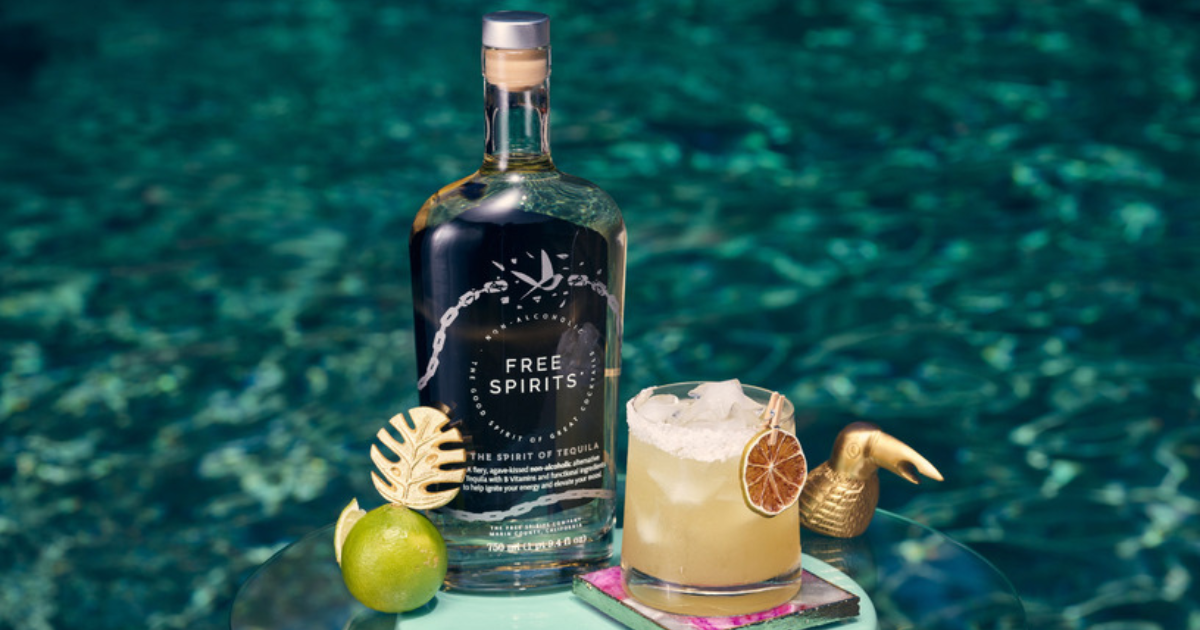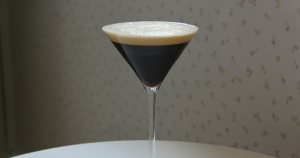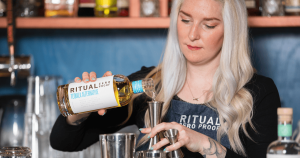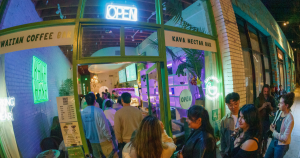Tequila, with its rich history, distinct flavors, and cultural significance, has captivated many. More recently, the surge in alcohol alternatives has introduced an intriguing update: non-alcoholic tequila. Let’s dive into this unique spirit.
About tequila
Originating from the blue agave plant, this iconic drink is more than just a centerpiece for celebratory shots or the backbone of a zesty margarita. It’s a testament to centuries-old craftsmanship and the soul of a nation.
The story of tequila begins with the indigenous people of Mexico, who fermented the sap of the maguey (agave) plant into a milky beverage called pulque. This drink held religious significance, often consumed during sacred ceremonies. The landscape changed in the 16th century with the Spanish conquest. The Spaniards, having exhausted their own supply of brandy, began experimenting with the agave plant, eventually leading to the distillation of what we recognize today as tequila.
Tequila’s real blossoming started in the 18th century, with the establishment of one of the first official tequila distilleries in the town of Tequila, Jalisco, by José Antonio de Cuervo. The region’s unique soil composition and climate proved perfect for the blue agave, the only agave suitable for tequila production.
Over the centuries, tequila transitioned from a rustic, local spirit to an international sensation, aided by Mexico’s rail connectivity in the 19th century and later by Hollywood’s embrace in the 20th century. Protected by a Denomination of Origin status since the 1970s, tequila can only be produced in specific regions in Mexico, ensuring its quality and cultural authenticity.
What is non-alcoholic tequila?
In recent years, there’s been a surge in the demand for non-alcoholic versions of classic spirits, and tequila is no exception. But what exactly is it?
Non-alcoholic tequila aims to capture the essence and flavor profile of traditional tequila without the alcohol content. Through innovative distillation processes or blending natural flavors, producers craft a beverage that mimics the taste, aroma, and mouthfeel of its alcoholic counterpart. It’s designed for those who love the taste of tequila but don’t want to consume alcohol.
The process of making non-alcoholic tequila often begins with understanding and analyzing the authentic flavors and aromas of traditional tequila. This serves as the foundational blueprint. Producers break down its profile—the sweet and earthy tones of the agave, the peppery bite, and other subtle nuances. Here’s a bit more about how it’s made:
- Sourcing ingredients: while some non-alcoholic tequilas use agave extracts or syrups as a base, others rely on a blend of botanicals that mimic or complement the natural flavors of tequila. Ingredients like capsicum can reproduce the peppery notes, while certain herbs and spices can evoke the more vegetal and earthy tones.
- Distillation and flavor stripping: some producers start with a base spirit similar to traditional tequila, then use specialized techniques to remove or “strip” the alcohol from the mix. This can be done through processes like vacuum distillation, where the spirit is heated at lower temperatures (because of the vacuum), allowing the alcohol to evaporate without affecting the flavor compounds too drastically.
- Blending and flavoring: once the alcohol is removed or if starting from scratch, the next step involves blending and flavoring. Here, the non-alcoholic base is infused with a mix of botanicals, extracts, and other natural ingredients to replicate (as closely as possible) the taste profile of alcoholic tequila. Master blenders play a crucial role in ensuring the final product is balanced and evocative of the original spirit.
- Maturation (sometimes): while not as common, some non-alcoholic tequilas might undergo a short maturation process in oak barrels. This isn’t to develop the spirit like traditional aging, but rather to infuse the liquid with the woody, caramel, or vanilla notes often found in aged tequilas.
- Filtration and bottling: finally, the liquid goes through filtration to remove any residual particles, ensuring clarity. It’s then bottled, ready for consumers to enjoy.
How to choose a non-alcoholic tequila
As the world of non-alcoholic spirits expands, the options on the shelves multiply. For those seeking the essence of tequila without the alcohol, here’s a concise guide to picking the best non-alcoholic tequila for your palate:
- Check the ingredients: begin by looking at the ingredients. Quality non-alcoholic tequilas often use natural ingredients and botanicals to recreate or complement the tequila flavor. Mind excessive artificial flavors or sweeteners, which can overshadow the authentic agave essence.
- Understand the production process: some brands might start with an alcoholic base and then remove the alcohol, while others build the flavor from scratch using botanical infusions. Neither is necessarily superior, but they can result in different flavor profiles.
- Recommendations: ask for recommendations. Non-alc connoisseurs are often vocal about their favorite picks, as you can see from our expert picks articles. These experts can offer insights into the product’s taste, aftertaste, aroma, and how closely it resembles real tequila.
- Consider the brand’s reputation: reputable brands tend to prioritize the quality of their products. Check if the brand has a history in the beverage industry or if they’ve received any awards or recognition.
- Experiment and sample: taste is subjective. What might be a hit for one person might be a miss for another. If possible, attend tastings or purchase smaller bottles to try different brands. Over time, you’ll zero in on the one that resonates with your taste buds.
Above all, enjoy the process of exploring the category and discovering which options you like best.
Comparing the best non-alcoholic tequilas
Here are five of my favorite booze-free tequilas as of September 2024, plus one bonus pick that’s not exactly a tequila but is too good to omit.
Flavor profile: Cut Above’s tequila alternative offers a rich blend of botanicals that seek to capture the essence of traditional tequila, with agave front and center, complemented by hints of lime and sea salt.
Usage: best suited for sipping or in cocktails where the tequila flavor needs to shine, such as margaritas.
Free Spirits – The Spirit of Tequila
Flavor profile: a slightly peppery and earthy note, this spirit captures some of the more refined elements of tequila. The agave essence is there, with an added complexity from other botanicals.
Usage: Highly versatile, it works well in a broad range of mocktails.
Ritual Zero Proof – Tequila Alternative
Flavor profile: Ritual Zero Proof’s tequila alt is recognized for its layered flavors, combining the brightness of Mexican lime, the savory depth of the blue agave heart, and a slight spicy finish reminiscent of traditional tequila.
Usage: can be enjoyed neat, on the rocks, or as a base for most tequila-based mocktails.
Flavor profile: CleanCo’s tequila alternative leans towards the fresher side, with a clear agave taste accompanied by subtle hints of herbs and citrus.
Usage: a refreshing choice for lighter mocktails or served with tonic.
Flavor profile: classic Reposado taste with a unique blend of organic agave, American oakwood, bay leaf, barley, brown sugar, and a distinctive heat from chili seed shells.
Usage: ideal for margaritas and palomas. Not intended to be served neat.
Bonus: Little Saints St. Ember
Flavor profile: while not exactly tequila, Little Saints St. Ember offers a smoky, deep flavor profile that brings to mind traditional mezcals. This essence of roasted agave with light peppery notes differentiates it from the others on this list.
Usage: perfect for those looking to recreate smokier tequila-based cocktails or enjoy it on its own for a unique, alcohol-free experience.
Non-alcoholic tequila cocktail ideas
Ranch Water
Ingredients:
- 2 oz non-alcoholic tequila
- Squeeze of fresh lime
Top with sparkling water. Serve over ice in a tall glass.
Margarita
Ingredients:
- 2 oz non-alcoholic tequila
- 1 oz non-alcoholic triple sec (optional)
- 1 oz fresh lime juice
- 0.5 oz agave syrup
Shake ingredients with ice. Strain into a salt-rimmed glass.
Bloody Maria
Ingredients:
- 2 oz non-alcoholic tequila
- 2 oz tomato juice
- 0.5 oz lemon juice, freshly squeezed
- 1/2 tbsp prepared horseradish, to taste
- 4 dashes Worcestershire sauce
- 2 dashes Tabasco sauce
- 2 dashes Tapatio hot sauce
- 1 pinch celery salt
- 1 pinch ground black pepper
Shake ingredients with ice. Pour into a glass with ice. Garnish with a lemon wedge, lime wedge, cucumber spear, sweet pepper slices, or jalapeno pepper slices.
FAQs about non-alcoholic tequilas
Why would anyone drink non-alcoholic tequila?
People choose non-alcoholic tequila for various reasons, including lifestyle preferences, health considerations, and the desire to enjoy the social aspects of drinking a cocktail without alcohol’s effects.
What does non-alcoholic tequila taste like?
Non-alcoholic tequila aims to capture the flavor profile and essence of its alcoholic counterpart without the alcohol content. However, the taste can vary among brands and formulations. In general, a well-made non-alcoholic tequila should offer:
- Agave notes: one of the most distinctive flavors in traditional tequila is the blue agave plant. Non-alcoholic versions often emphasize this note to anchor the spirit’s authenticity.
- Earthy undertones: tequila, especially the more artisanal varieties, often has an earthy, mineral quality. Non-alcoholic versions might incorporate such undertones to add depth to their flavor.
- Hints of sweetness: traditional tequila can have sweet notes ranging from citrus to caramel, depending on the aging process and the type (Blanco, Reposado, Añejo). Non-alcoholic tequila might use natural sweeteners or botanicals to recreate this element.
- Slight spice: some non-alcoholic tequilas add a bit of spice or warmth to replicate the slight burn or warmth one might experience with alcoholic tequila.
- Botanical complexity: to add depth and layers to the flavor, non-alcoholic tequilas might incorporate various botanicals. These can range from herbs to citrus peels to other plant extracts.
- Mouthfeel: one challenge for non-alcoholic spirits is replicating the mouthfeel of alcohol. Some non-alcoholic tequilas might feel slightly thinner, while others use ingredients to provide a more rounded, fuller mouthfeel.
Does non-alcoholic tequila actually taste like alcoholic tequila?
It’s important to understand that, while non-alcoholic tequila seeks to emulate the taste of traditional tequila, there will always be some differences due to the absence of alcohol. The experience also depends on the quality of the product and its formulation.
Some come astonishingly close to the real thing, with notes of agave, pepper, and even the subtle smokiness found in some traditional tequilas. Others may have a more botanical profile, focusing on the flavors that complement tequila rather than replicating it precisely.
The non-alcoholic beverage industry is booming and more options are likely to emerge, potentially offering even closer approximations to the real deal.
Does non-alcoholic tequila have the same burn as alcoholic tequila?
While they lack the alcohol burn, many non-alcoholic tequilas offer a similar complexity and aim to replicate that burn with the use of spicy notes.
Is non-alcoholic tequila completely alcohol-free?
Most non-alcoholic tequilas contain minimal to no alcohol, typically less than 0.05% ABV.
Is non-alcoholic tequila good for you?
Non-alcoholic tequila is emerging as a healthier alternative to its traditional alcoholic counterpart, owing largely to the absence of ethanol.
Ethanol, the primary intoxicating ingredient in alcoholic beverages, has been linked to a host of health issues, ranging from liver damage and addiction to metabolic disruptions and cognitive impairments when consumed excessively. Furthermore, the absence of alcohol means non-alcoholic tequila usually contains fewer calories, potentially benefiting those mindful of their caloric intake.
Beyond the lack of ethanol, many non-alcoholic tequila brands emphasize natural ingredients, eschewing artificial flavors and sweeteners, which can be detrimental to health in their own right. This focus on natural components often results in a beverage that aligns more closely with health-conscious consumer preferences. However, as with any beverage choice, individual health considerations are crucial when integrating non-alcoholic tequila into one’s lifestyle.
What is the best non-alcoholic tequila for cocktails?
When deciding on the best non-alcoholic tequila for cocktails, you might consider:
- Sampling: taste is personal. If possible, sample a few options to decide which one resonates with your palate.
- Reading reviews: reviews can offer insights on how a particular brand performs in cocktails.
- Versatility: consider how the non-alcoholic tequila pairs with various mixers and if it can be used in a wide range of mocktails.
Lastly, as the non-alcoholic spirits category is rapidly evolving, new brands and improved formulations are emerging. Staying updated with industry news can help you discover new and exciting options for your cocktails.
What is the best non-alcoholic tequila for a margarita?
When choosing a non-alcoholic tequila for a margarita, consider the following:
- Taste profile: opt for a brand that retains the peppery, agave-forward profile of traditional tequila.
- Mouthfeel: one of the challenges of non-alcoholic spirits is replicating the warmth and body of alcohol. Taste test to find one that isn’t too thin or watery.
- Mixability: ensure that the non-alcoholic tequila mixes well with other ingredients, especially if you’re planning to make cocktails.
Are there other alcohol-free spirits?
As of September 2024, there are 1,300+ different alcohol alternatives on the global market, including non-alcoholic spirits like gin and whiskey, non-alcoholic wines like Chardonnay and Cabernet Sauvignon, non-alcoholic beers like stouts and lagers, ready-to-drink mocktails like palomas and mules, as well as bitters, aperitivi, sparkling teas, and much more. There’s something for everyone!
About the author
Douglas Watters is Co-Founder of Dry Atlas. Previously, he opened America’s first booze-free bottle shop, Spirited Away. For more from Douglas, follow him on LinkedIn.






